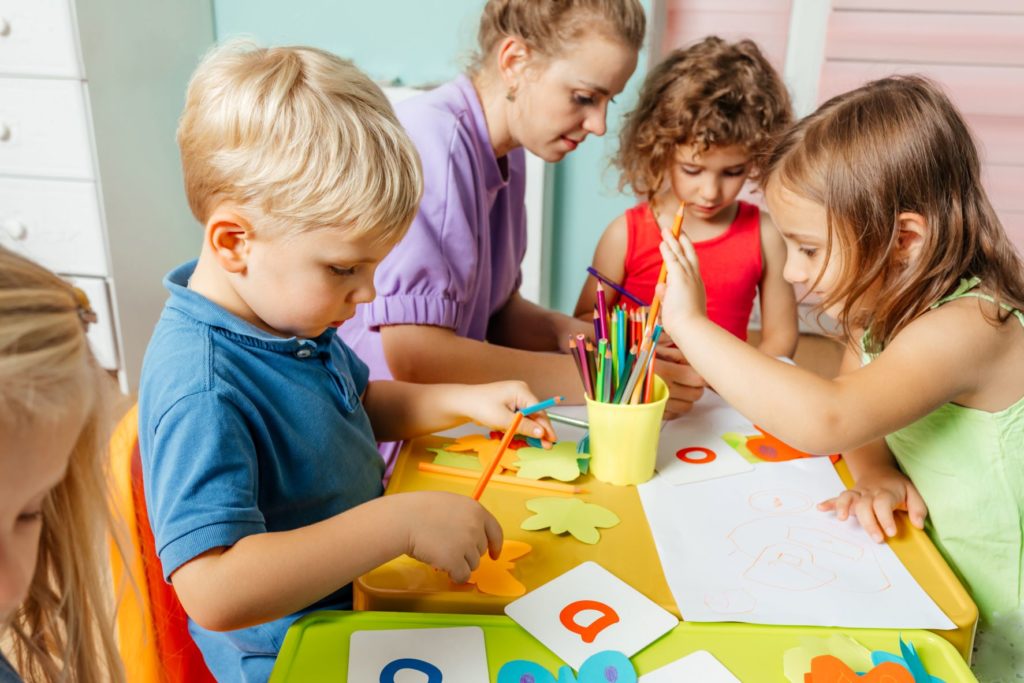
Your little peanut is growing up.
She just turned three years old, is potty trained and enjoys playing with the other children. So it’s perfectly natural to wonder if she’s ready for preschool, either later this year or if you should start investigating when to register her for the coming school year.
Let’s take a look at some questions to consider before enrolling your little one in a preschool program.
When Do Kids Start Preschool?
The answer to this question depends on what you mean by preschool. Are you talking about child care options for children who aren’t yet eligible for kindergarten? If so, the answer is whenever your preferred preschool or child care center will accept your child.
But if you’re interested in more traditional preschool programs — such as programs that imitate standard classroom environments, use curriculum and help kids reach specific developmental milestones — the answer is between the ages of 3 and 5.
What Are the Benefits of Preschool?
Preschool isn’t mandatory. There isn’t a single U.S. state that requires children to attend an early education program before they turn 5.
Studies have shown the numerous benefits of structured education during the early years. Some of them include:
Social Skills
Children learn more than their shapes and the colors of the rainbow when they attend preschool. They also learn social interaction skills such as sharing with others and working with them to accomplish common goals — both of which will greatly benefit them later in life.
Physical Health
Most preschool programs make time for exercise, physical play and other activities that get kids’ blood pumping, which can help prevent childhood obesity. By learning to exercise at an early age, it’s likely that your children will be healthier in their teenage and adult years, too.
Academic Success
Preschool can also lead to greater academic success. The Carnegie Foundation discovered that kids who received early childhood education (ECE) got more out of school at every grade. They’re also more likely to graduate from high school, attend college and earn a comfortable living than children who are not exposed to ECE programs.
Preschool is beneficial for young children. Now you must ask if your child is ready for preschool.
Let’s find out!
Is My Child Ready For Preschool?
If your child is about to turn 3, you’re probably wondering if you should enroll them in a preschool now or wait another year.
Here are a few signs to look for to know if your child is ready:
- Is Your Child Potty Trained? Some preschools require kids to be potty trained before they enroll. Make sure your child knows how to use the toilet — or is at least well on their way toward this goal — before you sign them up for any preschool programs.
- Does Your Child Follow Directions? Preschool teachers don’t expect their students to adhere to strict rules and regulations. But your child does need to be able to follow basic instructions like “please clean up the toys” and “please wait in line.”
- Can Your Child’s Speech Be Understood? It’s difficult for teachers to provide a quality early education if they can’t understand their students’ speech. Ensure your kiddo can make themselves understood before starting preschool.
- Does Your Child Play Well With Other Kids? When your children go to preschool, they’ll be surrounded by other similarly aged kids. Are they ready for this? Assess your children’s social skills before enrolling them in any form of early childhood education.
- Will Your Child Be Able to Separate From You? Lastly, ask yourself if your child will suffer from separation anxiety once you enroll them in preschool. It’s normal for kids to cry when their parents drop them off. But your child should understand that you’ll always come back for them before you commit to a standardized education program.
Dealing With Separation Anxiety

Separation anxiety is common among preschool-age children and can be described as feelings of extreme distress that a kid might experience when becoming separated from parents, grandparents or other primary caregivers.
Once you enroll your child in preschool, he or she will be separated from you for significant periods of time, which may lead to feelings of anxiety, especially at first.
To deal with these feelings in a healthy and productive way, use these three tips:
Create a Consistent Goodbye Ritual
You should develop a goodbye ritual that you go through every time you drop your child off at preschool. It can include hugs and kisses, a funny song, handing your child their favorite toy, creating a “secret” handshake — it’s totally up to you.
Just make sure that your ritual isn’t too long and can be easily repeated on a daily basis. This will help your child feel comfortable and trust you to always come back.
Always Keep Your Promises
This is really important! If you tell your kid that you’re going to pick them up from preschool after nap time, make sure you’re actually waiting when the child wakes up.
This will build trust between you and your child. When they trust you to return, they’ll be able to develop the confidence they need to actually enjoy their time at school, learn a thing or two and interact with their teachers and the other kids in a healthy manner.
Practice Separating From Your Child
Like anything, the more time your child spends away from you, the more comfortable they’ll become with the arrangement. So help your child by practicing separation.
This is easily done by sending them to a grandparent’s house for the afternoon, or scheduling a playdate with a trusted friend and stepping away for a time.
We suggest practicing separation as much as possible before your child starts their first full day of preschool so that they’re prepared to be away from you.
Choosing the Right Preschool

Once you’ve evaluated your child and determined they’re ready to start preschool, it’s time to choose the right early education provider for your family. But how? We suggest evaluating all of the preschools in your area for the following criteria:
Location
Where is the preschool located and does this location work for you and your family? You may love a specific program, but if it’s on the other side of town, you might not be able to get your child there and back again on a regular basis.
Schedule
Next, assess each preschool’s schedule. When will you need to drop your child off and pick them back up again? And do these times work for you?
Your child’s age also plays a factor. In general, younger preschool-age children do shorter days and/or fewer days per week. The closer they get to kindergarten, though, the longer they’ll be in the classroom. Keep these things in mind when choosing a preschool.
Curriculum
What do the preschools you’re considering teach, and how do they teach it?
For example, faith-based programs may teach spiritual lessons along with academic ones. Is that something you want for your kids? If so, look for programs that align with your beliefs.
Then consider how each preschool teaches its students. This is where terms like Montessori and Reggio Emilia come into play. We encourage you to research different teaching methods to see which resonate with you and choose a preschool that uses that approach.
And there’s a difference between a preschool and a daycare. Click here to learn more.
Child Care Philosophies
It’s really important to choose a preschool program that has similar philosophies to you in terms of child care. How do the teachers and other staffers handle tantrums? What about conflict between students? Make sure they’re handled in a way that you approve of.
This will ensure that your child feels comfortable at school because they’ll be in an environment that they’re familiar with, while giving you peace of mind.
Cost of Enrollment
There are different costs associated with different preschool programs. Make sure you factor in enrollment fees before you get too excited about any one school.
Keep your personal budget in mind when selecting a preschool for your kids. You shouldn’t have to take out a second mortgage on your house to pay for early childhood education. Find a program that offers quality schooling at a price you can afford.
First Impressions
We recommend visiting each preschool on your list before enrolling your kids. You need to see these places with your own eyes.
When you arrive, don’t be afraid to ask the staff a myriad of questions like:
- Can I see a copy of your program’s license and inspection history?
- Has every staff member undergone an extensive background check?
- Does every teacher know how to provide first aid and CPR to students?
- What’s the typical student-to-teacher ratio at this preschool?
- How will you and other staff ensure my child’s safety at school?
- What does an average day at this preschool look like?
What’s the Difference Between Preschool and Pre-K?

Both preschool and pre-K refer to schooling that happens before a child reaches kindergarten. But that doesn’t mean they’re the same.
For example, many preschool programs accept children between the ages of 2.5 and 4.5 years old. Pre-K is usually for 4 or 5-year-olds. This is because pre-K programs usually offer more structured education and robust learning opportunities.
Think of it like this: preschool is where children are first introduced to public education. They’re able to learn a wide variety of skills, but often in a fun, informal way. Pre-K is specifically designed to get kids ready for kindergarten. Because of this, classes are more organized and tackle more advanced topics.
When Should My Kids Start Kindergarten?
Most kids start kindergarten when they turn 5. Some start as early as 4, while others wait until 6 or 7—it all depends on the maturity of the child in question. But plan to enroll your child into a kindergarten program when they reach 5 years of age.
Your state may require you to send your child to kindergarten at a certain age. For example, parents in Arkansas, Hawaii and Maryland must send their children to preschool when they turn 5. Colorado, Florida and Georgia require students to attend kindergarten by the time they turn 6.
So. Is your child ready for preschool? If you’ve answered yes to the questions above, then it’s certainly very likely! As such, they’ll experience all the benefits that these programs have to offer, like improved social skills, better physical health and a brighter academic future.
Make sure you choose a good preschool by assessing each institution in your area for the criteria listed above. Then enroll and watch your child grow by leaps and bounds!



